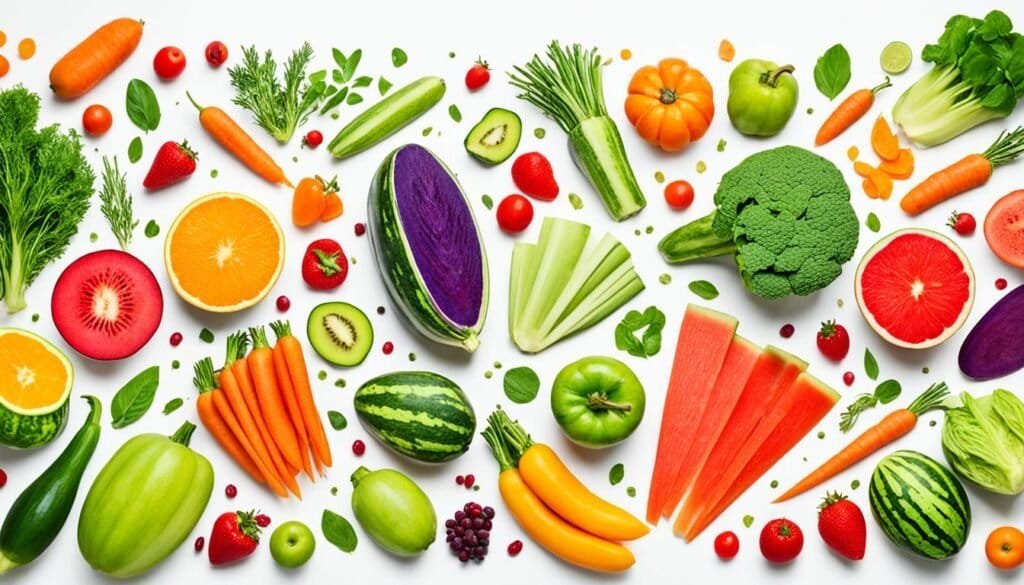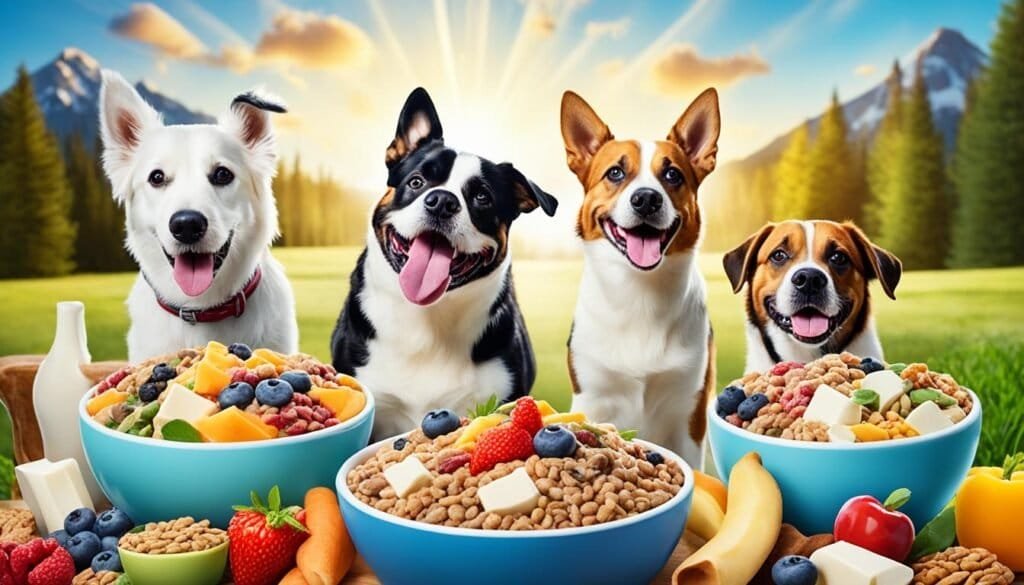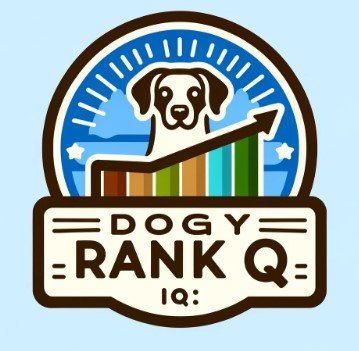Did you know that veterinarians have confirmed that 10 out of 13 of them prefer Royal Canin dog food for their own pets and the dogs they treat? This statistic highlights the high level of trust and satisfaction that professionals have in this brand, making it a top contender when it comes to choosing the best food for your canine companion.
Being a pet parent comes with its fair share of responsibilities, including providing your dog with a nutritious diet. Ensuring your dog has the right food can offer multiple health benefits, such as weight management and maintaining a healthy immune system, according to experts. Commercially processed canned or kibble foods are formulated to meet dogs’ nutritional needs for proteins, fats, carbohydrates, vitamins, and minerals. These foods undergo a process of quality control and inspection to catch any contaminants or pathogens before they affect pets or people.
Key Takeaways
- Veterinarians have a high level of trust in the Royal Canin brand, with 10 out of 13 using it for their own pets.
- Providing your dog with a nutritious diet can offer health benefits like weight management and immune system support.
- Commercially processed canned or kibble foods are formulated to meet dogs’ nutritional needs and undergo quality control.
- Understanding the importance of proper dog nutrition is crucial for pet owners.
- Exploring a variety of safe and nutritious food options can help ensure your dog’s overall well-being.
Understanding Dog Nutrition
When it comes to your canine companion’s dietary needs, it’s important to understand that domesticated dogs are omnivores, similar to humans. Omnivores are naturally able to consume and digest food from both animal and plant sources. This means the range of healthy dog treats and homemade dog meals can be wider than that of obligate carnivores, like wolves, who are not equipped to efficiently digest vegetation.
Dogs as Omnivores
Some dogs naturally enjoy fruits and vegetables, and they can even eat cooked vegetables without the need for pureeing. This versatility in their dietary preferences sets dogs apart from their more carnivorous counterparts. However, it’s important to note that not all types of meat are safe for all dogs, as some canines may have food allergies triggered by specific proteins, such as beef, chicken, eggs, fish, or dairy.
Common Food Allergies in Dogs
Approximately 85% of itchy dogs suffer from flea allergy dermatitis, while environmental or seasonal allergies are more common in dogs presenting with skin and ear problems. In contrast, food allergies are relatively uncommon in dogs. Pet owners should consult with their veterinarian to determine if their dog has any specific dietary restrictions or requirements due to allergies or sensitivities.
By understanding the unique nutritional needs of dogs as omnivores, and recognizing the potential for food allergies, pet owners can make informed decisions about the natural dog food, dog superfoods, and low-fat dog snacks that will keep their canine companions happy and healthy.
The Top Rated Foods for Dogs that are Safe and Nutritious
Cooked, unseasoned chicken, turkey, and beef are all great sources of protein for your dog. However, it’s important to remove all bones to reduce the risk of choking. Among the three, chicken is the most balanced meat as it is high in protein but also low in fat, making it the healthiest type of meat to serve canines.
Cooked, Unseasoned Chicken, Turkey, and Beef
Cooked, unseasoned fish is another healthy treat for dogs as it is a good source of protein and omega-3 fatty acids. As with chicken and beef, it’s crucial to remove all bones from the fish before serving.
Cooked, Unseasoned Fish
Cooked, unseasoned eggs, whether hard-boiled or scrambled, can also be a good treat for your dog as they are a great source of protein, vitamin D, selenium, and riboflavin.
Cooked, Unseasoned Eggs
Nutritious Fruits and Vegetables for Dogs

In addition to high-quality protein sources, your canine companion can also benefit from a variety of nutritious fruits and vegetables. These plant-based foods can provide essential vitamins, minerals, fiber, and antioxidants to support your dog’s overall health and well-being.
Cooked Pumpkin
Cooked and chopped-up pumpkin is a healthy and nutritious snack for dogs as it is a good source of fiber and beta-carotene, which can help with digestion and improve the appearance of your dog’s coat.
Cooked Green Beans
Cooked green beans are a good source of fiber, vitamin C, and other nutrients that can help support your dog’s overall health.
Cooked Carrots
Cooked carrots are a great source of fiber, vitamin A, and beta-carotene for dogs, but make sure they are cooked thoroughly, as raw or semi-raw carrots can be difficult for dogs to digest.
Cooked Spinach
Cooked spinach is a nutrition-packed treat for dogs, providing fiber, vitamin A, vitamin K, vitamin C, and potassium.
Sliced Apples – In Moderation
Sliced apples, with the seeds and core removed, can be a crunchy and vitamin-rich treat for dogs, but should be given in moderation due to their natural sugar content.
Bananas – In Moderation
Bananas are also a healthy treat for dogs, as they are high in potassium, fiber, and magnesium, but should also be given in moderation.
Healthy Grains and Dairy for Dogs

In addition to the protein-rich and nutrient-dense foods discussed previously, certain grains and dairy products can also be incorporated into your dog’s healthy, balanced diet. One such example is cooked oatmeal, which provides numerous benefits for canine health.
Cooked Oatmeal
Cooked oatmeal is a nutritious treat for dogs as it contains vitamin B, which helps maintain a healthy coat, and linoleic acid, a type of omega-6 fatty acid that supports the strength of dogs’ skin. Furthermore, the soluble fiber in oatmeal has made it an increasingly common ingredient in commercial dog food formulations, as it can aid in digestive health and regularity.
Choosing the Right Dog Food
When selecting the appropriate food for your canine companion, there are several crucial factors to consider. Firstly, it’s essential to ensure the dog food you choose meets the rigorous AAFCO (Association of American Feed Control Officials) nutrition standards. This can be determined by examining the nutritional adequacy statement on the product label.
AAFCO Nutrition Standards
All high-quality dog food brands should have a team of veterinary nutritionists on staff to regulate the use of premium ingredients. This guarantees that the formulation not only meets but exceeds the AAFCO’s established nutritional guidelines, providing your dog with a complete and balanced diet.
Ingredients and Palatability
The ingredient list on the packaging displays all the components in descending order by weight, with the first three being the most significant. Opt for dog foods that feature recognizable, whole-food ingredients to ensure your pup is receiving optimal dog nutrition, healthy dog treats, and natural dog food.
Nutritional Value and Proportions
In addition to ingredient quality, it’s crucial to consider the overall nutritional value and proportions of the dog food. Look for formulas that provide the appropriate balance of proteins, fats, carbohydrates, vitamins, and minerals to support your dog’s dietary requirements, dog superfoods, and high-protein dog diet.
Dog’s Size, Weight, and Life Stage
Finally, be mindful of your dog’s size, weight, and life stage when selecting a food. Puppy formulas or “all life stages” options are recommended for young dogs to meet their evolving nutritional needs, while large breed and small breed dogs may require specialized formulations. Additionally, senior dogs, typically 7 years and older, have unique dietary considerations, such as weight management and palatability.
By considering these key factors, you can ensure your dog receives the most low-fat dog snacks and grain-free dog food that cater to their individual nutritional requirements and preferences.
Conclusion
Providing your dog with a nutritious and safe diet is essential for their overall health and well-being. By understanding the nutritional needs of dogs as omnivores, as well as common food allergies, pet owners can make informed choices about the top-rated foods that are safe and beneficial for their canine companions. The list of recommended human foods, including cooked meats, fish, eggs, fruits, and vegetables, can be incorporated into your dog’s diet as healthy treats or toppers to their regular dog food.
Additionally, considering factors such as AAFCO nutrition standards, ingredient quality, and your dog’s individual needs can help you select the right commercial dog food. By prioritizing your dog’s dietary requirements, you can ensure they stay happy and healthy.
Whether you opt for homemade dog meals, natural dog food, or high-protein dog diet options, the key is to provide your furry friend with a balanced, nutritious, and safe diet that caters to their unique dog dietary requirements. By incorporating healthy dog treats and dog superfoods into their meals, you can support your dog’s overall well-being and promote a long, vibrant life.
FAQ
What are some of the top-rated foods for dogs that are safe and nutritious?
Some of the top-rated foods for dogs that are safe and nutritious include cooked, unseasoned chicken, turkey, and beef; cooked, unseasoned fish; cooked, unseasoned eggs; cooked pumpkin; cooked green beans; cooked carrots; cooked spinach; sliced apples (in moderation); bananas (in moderation); and cooked oatmeal.
Why are dogs considered omnivores, and how does that impact their dietary needs?
Unlike wolves and cats, which are obligate carnivores, domesticated dogs are omnivores, similar to humans. This means they are naturally able to eat and digest food that comes from both animals and plants. As omnivores, dogs have a wider range of healthy treats they can enjoy, including fruits and vegetables, in addition to meats and proteins.
What are some common food allergies in dogs, and how can they be addressed?
Some dogs can have food allergies triggered by different types of proteins, such as beef, chicken, eggs, fish, and dairy. It’s important to pay attention to your dog’s individual needs and avoid feeding them any proteins that may cause an allergic reaction.
How can I ensure the dog food I choose meets my dog’s nutritional needs?
When choosing dog food, look for a brand that meets AAFCO nutrition standards, has a team of veterinary nutritionists on staff, and provides a quality ingredient list and feeding guide. It’s also important to consider your dog’s size, weight, and life stage when selecting the appropriate dog food.
What are the benefits of incorporating human foods into my dog’s diet?
Incorporating safe and nutritious human foods, such as cooked meats, fish, eggs, fruits, and vegetables, can provide your dog with additional health benefits, such as weight management, improved digestion, and a healthier coat. These foods can be used as healthy treats or toppers to your dog’s regular diet.







